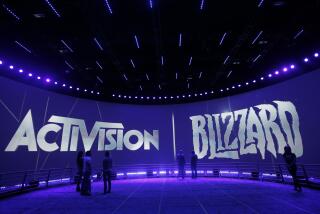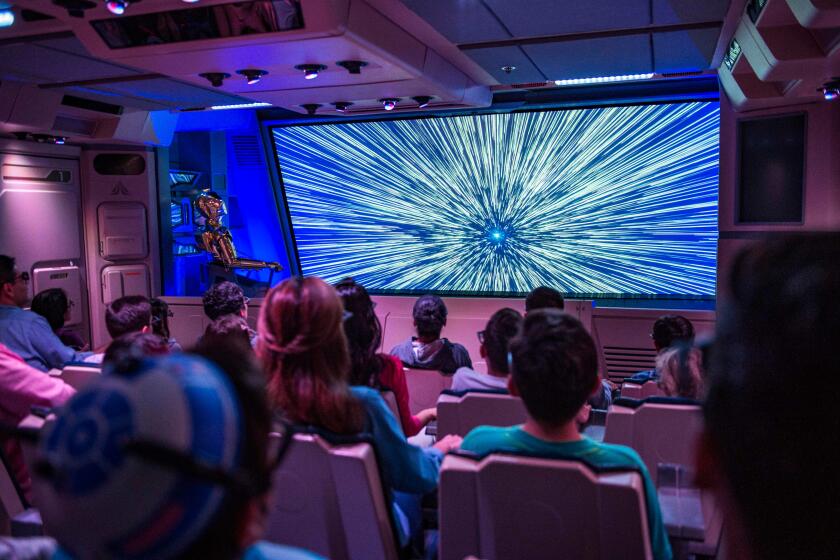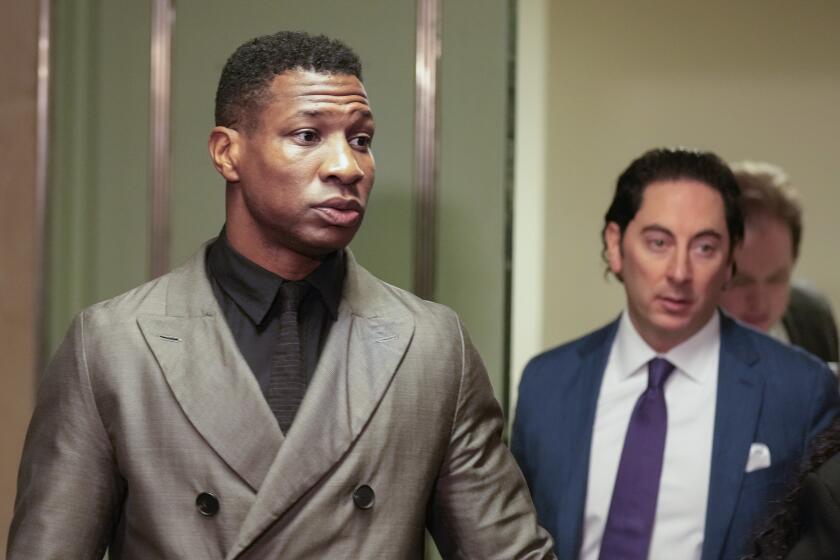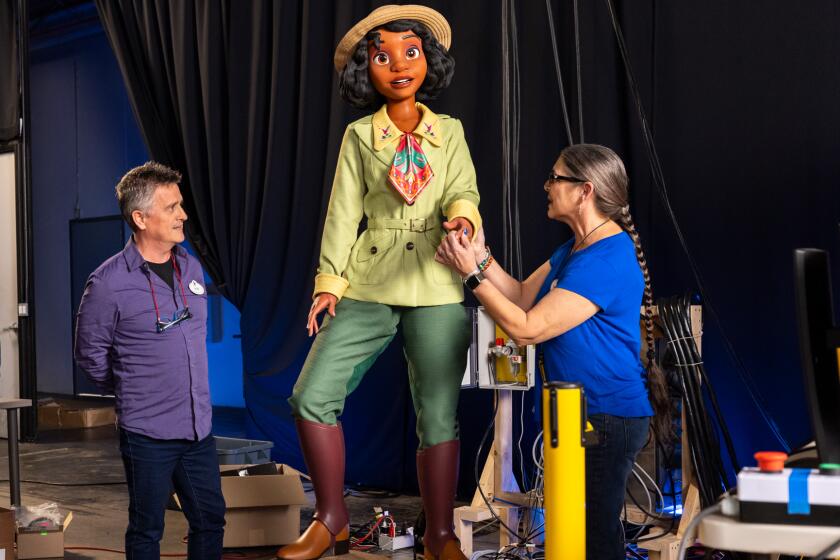SXSW: Female gamers tell their stories in ‘GTFO,’ which tackles industry sexism
The following column was originally published more than a year ago. This week, citing threats of violence, organizers canceled two panels related to harassment and the gamingindustry planned for next year’s South by Southwest conference in Austin, Texas.
Today’s game-playing audience is split nearly 50/50 along gender lines, according to recent studies, and nearly 70% of those dedicated players are over 18.
These findings by the Entertainment Software Assn. hardly jibe with the stereotype of the antisocial, video-game addicted teen. If anything, they point to a newfound diversity for a medium that was always thought to be strictly for adolescent males.
But “GTFO,” a documentary premiering Monday at the South by Southwest festival in Austin, Texas, paints another picture, and it isn’t half as pretty.
SIGN UP for the free Indie Focus movies newsletter >>
Women quoted in the film talk about receiving rape and death threats as if it’s a common, everyday occurrence. Former BioWare game writer Jennifer Brandes Hepler says she was once receiving up to 500 harassing emails per day, noting that she even found someone on a message board saying he wanted to murder her children.
There are so many offensive comments directed at women in the gaming community that the website fatuglyorslutty.com emerged to fight the phenomenon by collecting the comments and attempting to defuse their power with humor. “Every message is the same,” says a featured dispatch on the women-run site. “I’m always either fat and ugly, or a slut.”
One cringe-inducing scene in “GTFO,” an acronym whose full title is not newspaper-appropriate, shows a male gamer who smells the hair of a woman at a gaming tournament. The film attempts to break down the causes for such inappropriate behavior, walking viewers into a world where being different — in this case, not male — can be met with animosity.
“GTFO” does dispel some long-held myths, and the film is not all grim. It shows that this is, indeed, a maturing medium, as games are becoming broader in their subject matter and approachability.
Festivals such as SXSW are starting to chart these new gaming frontiers. One convention talk this weekend will look at socially conscious games such as “1979 Revolution,” about the Iranian revolution, and the festival’s game conference will showcase 30 risk-taking independent games.
“GTFO’s” director, 27-year-old Shannon Sun-Higginson, approaches the topic almost anthropologically. She isn’t a gamer, she admits, but became fascinated by the community in 2012, when she saw video of the online gaming competition Cross Assault. In it, a female player was treated like an alien specimen there for male enjoyment.
A few days after watching the online clip, she took a bus from New York to Boston and began interviewing female gamers at a convention.
“I didn’t have all that much planned,” she says, “but the movie sort of snowballed because a lot of these women were really interested in talking about this subject and sharing their stories and letting other people know this was going on. One person would refer me to another person, and it got bigger and bigger from there.”
She worked on the film for three years when she wasn’t at her day job as a production coordinator at Zero Point Zero Productions. The film was ultimately completed after raising more than $33,000 on crowd-funding site Kickstarter.
The tone of “GTFO” is educational. It’s broken up as chapters. Topics of discussion include the history of game marketing, the portrayal of female characters and the perception of female gamers. Sections are introduced with colorful 8-bit animations that show a female avatar being thwarted by cultural forces.
FULL COVERAGE: South by Southwest
Its patient approach to a complex, sometimes-abstract subject was no doubt aided by the fact that Sun-Higginson went into the project as an outsider.
“For me, at least, I never thought of games as just another form of media. I thought of them as something that I personally couldn’t do,” she says. “I don’t have that hand-eye coordination. I didn’t grow up playing tons of games. They seemed exclusive. I think a lot of people feel that way.”
This influx of new voices and new players has parts of the gaming community undergoing an identity crisis — a change, if you will, in ownership. At least some of the fear seems to stem from the idea that games will be changed into something unrecognizable from what they are today.
Die-hard players, as game writer Hepler points out in “GTFO,” identify themselves as “gamers.” This is where games differ from other forms of mass media. Movie fans, she says, don’t label themselves “moviegoers.” This was one of Sun-Higginson’s favorite quotes of the film.
“For someone who doesn’t play games it might almost seem counterintuitive that someone who really loves something doesn’t want the world to also love it,” says Sun-Higginson. “That was something that was confusing to me as an outsider. If I like a movie or a weird TV show I try to send it to every single person who will play attention.
“But for people who grew up feeling like games were what made them different from everyone else, I can see how they would view other people who want to be a part of it as intruders.”
Her film is arriving when this sort of harassment is no longer the gaming world’s dirty little secret. In 2014 an online movement dubbed “gamergate” put the spotlight on the game community’s underbelly.
Gamergate is a phrase that last summer became associated with violent, social-media-driven comments directed at female game developers and writers, namely those who attempted to intellectualize the medium.
“It’s a messy, hairy topic,” Sun-Higginson admits, and the film was largely completed when gamergate blew up. Still, Sun-Higginson was able to add a postscript about the phenomenon, which she labels the “most well-known” incident of harassment in the video-game industry but one she expected after studying the field for almost three years.
Her fear is that “GTFO” will scare young women out of pursuing a career in games, but she intends it to open a dialogue. It’s clear, for instance, that every woman in the film loves games. They speak not of a world they left behind but one they continue to fight to make more inclusive.
“If you’re a woman in gaming and you watch this movie, what should be the take-away? I guess what we decided upon was that the women who are in this movie and are still in the industry — women who have received threats — are incredibly strong and impressive people.”
We’re at South by Southwest until March 22. Join us at latimes.com/sxsw for ongoing coverage of the festival.
Twitter: @Toddmartens
More to Read
The biggest entertainment stories
Get our big stories about Hollywood, film, television, music, arts, culture and more right in your inbox as soon as they publish.
You may occasionally receive promotional content from the Los Angeles Times.







